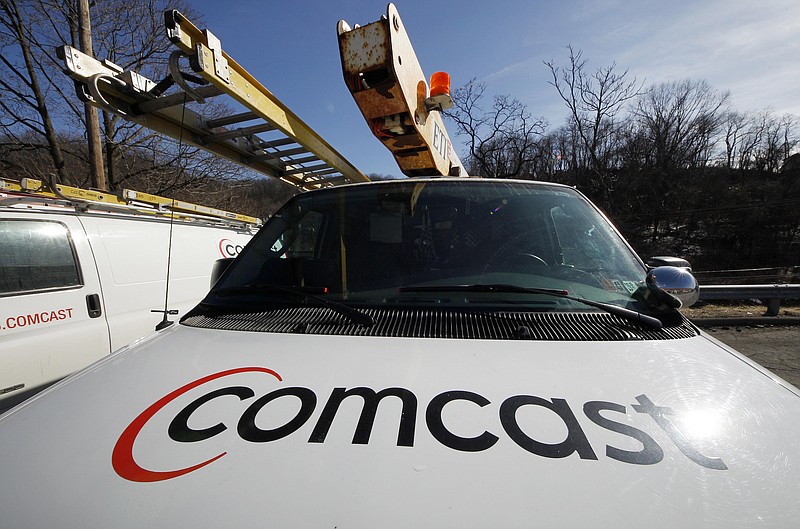As thousands of local students are moving to online course work and more employees are doing telework from home, major internet providers are offering some short-term upgrades, discounts and service expansions to aid the expected surge in online usage and demand.
Comcast and Charter Communications on Monday will begin offering two months of complimentary free broadband services to low-income families and students. The cable TV providers are also opening up more free Wi-Fi hotspots to help with online instruction programs.
At the same time, AT&T and Comcast are suspending usage caps on their broadband services for at least a couple of months. (EPB Fiber Optics and Charter's Spectrum do not have such data caps).
Comcast President of Consumer Services Dana Strong said that it will suspend its usual $9.95-a-month charge for new users of its Internet Essentials program for two months to help improve broadband services for the millions of low-income Americans who don't have internet service amid the coronavirus outbreak.
"As schools and businesses close and families are encouraged, or even mandated, to stay home, Internet connectivity becomes even more important," Strong said. "We also know that for millions of low-income Americans who don't have Internet service at home, this uncertain time is going to be even more difficult to manage."
Charter is offering free Spectrum broadband and Wi-Fi access for 60 days to households with K-12 or college students who do not already have a Spectrum broadband subscription. Installation fees also will be waived for new student households, and Charter said it will open its Wi-Fi hotspots for public use and continue to offer Spectrum Internet Assist, a broadband program to eligible low-income households delivering speeds of 30 Mbps.
How to sign up for complimentary broadband:
* To sign up for Comcast’s program for low-income families, applicants can visit www.internetessentials.com. The accessible website also includes the option to video chat with customer service agents in American Sign Language. There are also two dedicated phone numbers 1-855-846-8376 for English and 1-855-765-6995 for Spanish.* To enroll in Charter’s free-broadband program for students, eligible consumers must call 844-488-8395. The company said it will waive installation fees for new student households.* EPB offers its NetBridge Student Discount Program to provide discounted high-speed broadband for qualified households with children in Hamilton County’s Free and Reduced Meals Program. The service is available to qualified households for $26.99 a month, or less than half EPB’s current rate of $57.99 a month for 100 Mbps service.
"As the country works collaboratively to contain this pandemic, broadband internet access will be increasingly essential to ensuring that people across the country are able to learn and work remotely, that businesses can continue to serve customers, and that Americans stay connected and engaged with family and friends," Charter Communications spokeswoman Cameron Blanchard said
The coronavirus threat and official policies of "social distancing" are leading millions to stay home, doing meetings via video chat and probably watching more Netflix and YouTube videos rather than going to movie theaters. With more people at home and doing telework, internet service providers expect a big uptick in bytes going through their tubes.
Chattanooga's biggest provider of local internet services, EPB Fiber Optics, provides internet, video or phone service to more than 105,000 customers in the Chattanooga area, and officials said they are ready to handle the expected increase in broadband usage as telework and online learning grows.
"Our fiber optic network has plenty of capacity and we have never imposed any data caps," said J.Ed. Marston, vice president of communications at EPB.
AT&T last week become the first major national internet provider to lift its caps on overuse charges imposed on heavy broadband users.
"Many of our AT&T Internet customers already have unlimited home-Internet access, and we are waiving Internet data overages for the remaining customers," reads an AT&T statement.
Previously, AT&T imposed monthly data caps of 150GB on DSL, 250GB on fixed wireless, and 1TB on most of its faster wireline services. Overuse charges are $10 for each additional 50GB, up to a maximum of $100 or $200 per month, depending on the plan.
Comcast announced Friday it will also pause its data plans that charge extra fees for the heaviest users of broadband services. The heaviest users tend to be gamers or individuals with businesses or multiple streaming devices in their home at one time.
On the other end of the internet spectrum, Comcast is expanding its Internet Essentials program, which it launched in 2011 to help bridge the digital divide in the United States. The program provides internet service to qualified low-income people, plus the option of buying an Internet-ready computer at a discounted price.
Comcast officials said the company is reaching out to its thousands of governmental and nonprofit partners, including Tech Town, to help expand Internet Essentials signups.
"During this extraordinary time, it is vital that as many Americans as possible stay connected to the internet - for education, work, and personal health reasons," Comcast CEO Dave Watson said.
According to U.S. Census data, households living in cities with the highest poverty rates are up to 10 times more likely than those in higher-earning communities not to have fixed broadband at home.
Comcast offers its Internet Essentials program to those who are on public assistance programs such as Social Security, food stamps, the national school lunch program, housing assistance, disability assistance or Medicaid.
Internet Essentials is the largest broadband adoption program of its kind in the United States, with connections to 8 million low-income Americans, including 27,000 people in the Chattanooga area.
Contact Dave Flessner at dflessner@timesfreepress.com or 423-757-6340.
